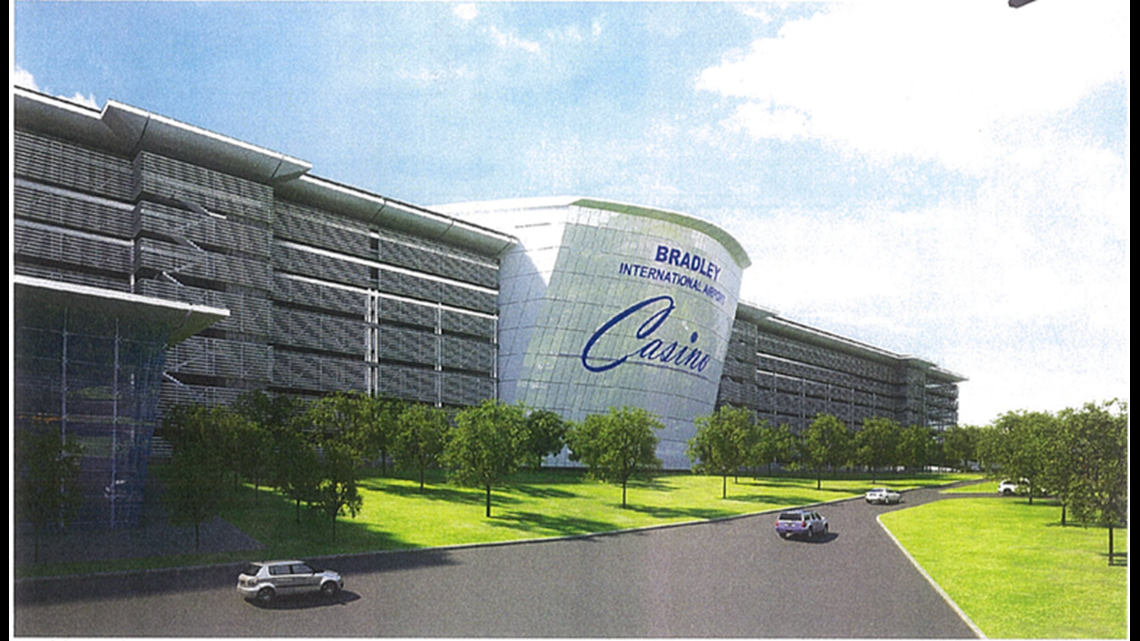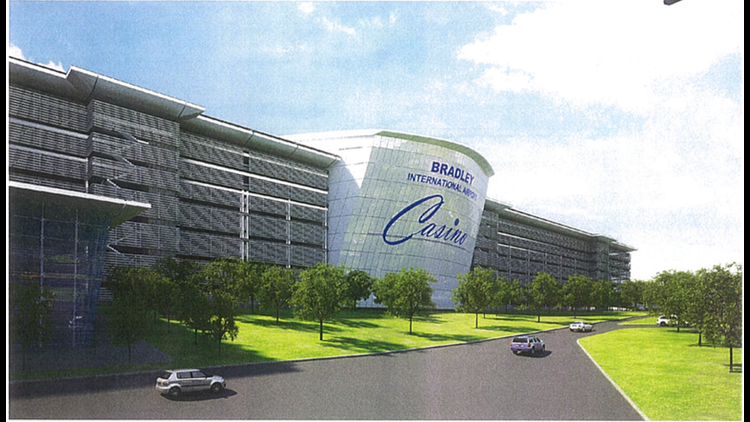WINDSOR LOCKS – It’s a roll of the dice whether Bradley International Airport will add a casino but it’s creating chatter across state borders.


Newly released documents show an idea by Connecticut Airport Authority (CAA), along with the town of Windsor Locks, to team up with the Mashantucket Pequot Tribe and the Mohegan Tribal Gaming Authority to build a “first rate, sustainable and profitable casino and entertainment facility.”
The plan includes the goal to attract 10,000 casino-goers daily, along with the 17,000 arriving and departing passengers at the airport.
MGM Springfield, a $950 million casino and entertainment facility is set to open in 2018, would be about 17 miles away from the Bradley casino.
“If you put a casino in the airport it's gonna take away customers from Foxwoods, it's gonna take away customers from Mohegan Sun, and it would take away customers from us,” Alan Feldman, MGM Resorts International executive vice president of global government and industry affairs said.
While competition is a concern, Feldman also addresses that the proposal would be bad for taxpayers, saying he disagrees with the lack of transparency by the CAA.
“The point of this is the fact that all of this is being done in secret, behind closed doors, there is no public input,” Feldman. “For anyone who's in Hartford now you can see what happens when you allow public agencies to engage in these secretive backroom meetings what you end up with is a baseball stadium that's incomplete and no one can use it, that's not the way this should be done.”
Feldman said based on hundreds of pages of emails and documents obtained under the Freedom of Information process the communication about this plan was done “in secret” for more than a year.
Windsor Locks First Selectman Chris Kervick said hearing from the public was his first order of business.
On the night he was sworn in, November 24, 2015, a resolution was passed indicating willingness to enter into negotiations for the purpose of the establishment of a casino within the town on any sites proposed by the CAA, Sportstech, or at any other suitable development site if. The conditions wer: A public hearing must be conducted, a town meeting must be held and a referendum vote must be put in place.
The plan is simply just an idea, and Kervick said if it moves forward, important questions will be asked.
“Does it make sense from a public safety point of view? Does it make sense from a traffic and transportation point of view? And from a revenue point of view for the town of Windsor Locks?” he asked.
Kervick said ultimately the citizens would decide whether or not it was in the best interest of Windsor Locks.
The Connecticut Airport Authority released a statement, which includes that it does want to hear from the public, but withholding the plans so far, protected trade secrets. Kevin A. Dillon, executive director of the Connecticut Airport Authority, said:
“It is quite unfortunate that, after failing thus far in their extensive litigation and federal lobbying efforts, MGM has decided to expend even more resources on a public relations campaign that completely mischaracterizes the Connecticut Airport Authority’s proposal for casino development at Bradley International Airport. This desperate attempt at fear-mongering is just another chapter in MGM’s increasingly alarming track record of distorting the truth to protect its business interests and maximize its financial gain at the expense of the CAA. The CAA believes that it is important to correct these inaccuracies so the public understands the reality of the situation.
First, in proposed findings dated July 26, 2016, the Freedom of Information Hearing Officer assigned to the complaints brought by MGM against the CAA actually ruled in favor of the Connecticut Airport Authority on two of three complaints. The officer found that the CAA Board’s executive session discussions of a proposed casino were legal and did not violate the State’s Freedom of Information laws. The hearing officer also ruled that the CAA properly withheld from disclosure documents which constitute trade secrets. This refutation of MGM’s primary complaints essentially acknowledges the CAA’s arguments that disclosure of the negotiating process would only seek to harm the CAA’s negotiating posture to the benefit of other potential developers and those, like MGM, who are opposing any potential casino development for their own business purposes. Regarding the final complaint, the hearing officer did find that the disclosure exemptions provided to responses to RFPs only applied to RFPs issued by a public agency, and not to a public agency’s response to an RFP issued by a non-public entity. The CAA is considering its options with respect to that finding. All three of these proposed findings will be formally considered by the Freedom of Information Commission at a future meeting.
Second, it is also important to note that the ground transportation center site was recently withdrawn from consideration by the CAA. That proposed site, which MGM has attempted to characterize as an overwhelming development, would have constituted a one-floor project in a facility that is already being planned in furtherance of aviation purposes at Bradley. While we fully believe that the project would have been a high-class facility that could have provided a unique benefit to our passengers, it is disingenuous to characterize the development as overshadowing the airport itself. It is also the height of insincerity to allege secrecy as to what the CAA’s intention have been. We have repeatedly, in many public forums, indicated that our proposal was for a ground transportation center site. This proposal, which the CAA has publicly addressed multiple times in the past, would have incorporated the gaming facility into the ground transportation center that is being constructed at Bradley to house all of the rental car companies serving the airport, provide additional public parking options, and bolster intermodal connectivity. It is even more important to note that the documents referenced by MGM were released by the CAA after the CAA elected to withdraw that particular site from consideration. However, other sites remain under active consideration, and documents related to those sites which constitute trade secrets are properly exempt from disclosure in accordance with the proposed findings of the hearing officer.
As the CAA has publicly stated time and time again, there is significant opportunity for public input in the casino development process, including the Town of Windsor Locks’ commitment to hold a public referendum, the need for a public vote from the CAA Board of Directors, and a requirement for further state legislative action before any plans move forward. The CAA plans to continue its negotiations with MMCT, and we look forward to bringing an exciting project to the public for input and approval if our negotiations for site selection are successful.”
In a second statement, Dillon added:
“Despite renewed attempts by MGM to distort, mislead and distract, for their own financial benefit, the CAA stands by its statements regarding the importance of public approval in the casino development process. While the CAA has continued negotiating with the tribes to formulate a development plan worthy of being brought for public consideration, the town of Windsor Locks has committed to holding a public referendum on any such plan. In addition, the selected site will need to be approved by the CAA’s Board of Directors at an open, public meeting and further state legislative action will be required as well. While MGM has displayed an inability to grasp these facts, we have repeatedly and publically made this process clear. It is unfortunate that MGM’s goal is to mislead the public and we’re confident that the public will be able to see through MGM’s self-interest and work with us when and if we have a proposal for their consideration.”
MGM officials feel Connecticut has to re-visit gaming laws to open the door for commercial casinos.
“The best thing that could happen would be for special act 15-7 to be set aside and for a new process put in place that asks for bids from any competitor, anywhere in the world to come to Connecticut and put your best foot forward,” Feldman said.



